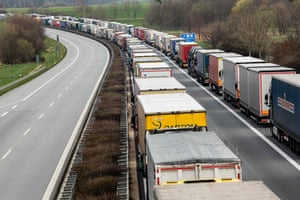Campaigners have called for the suspension of all live animal shipments out of Europe, and a restriction to the shortest possible journeys within Europe, over welfare and animal diseases concerns – as meat supply chains face potentially debilitating strain.
Last week queues of up to 60km (37 miles) formed at the Polish/German border on Wednesday after Poland announced that it was shutting to foreigners. Although the closure was supposed to apply solely to people, cargo experienced a knock-on effect, with some trucks reportedly taking as long as 18 hours to get through border controls. More queues formed at the Bulgarian/Turkish border.
Sabine Fisher of German animal welfare group Animal Angels said: “One driver told us that it had taken him three hours to travel 300 metres. There were trucks of sheep, bulls, cows. I’ve never seen a queue like it.”
Under EU regulations no animal should travel for more than eight hours without being rested. Campaigners have now sent a letter to the EU commission calling for the immediate suspension of live animal transport to non-EU countries, and of all journeys over eight hours within the EU, as such journeys also raise concerns over disease transmission.
The letter, signed by a number of organisations including Compassion in World Farming, Eurogroup for Animals and Animals International, said: “The potential for long distance animal transport to spread diseases, some of them zoonotic, is deeply worrying. EFSA [the European Food Safety Authority] has said that the stresses associated with handling and transport may cause latent infections to proceed to clinical disease. EFSA states: ‘such animals are more likely to infect others during the journey or after arrival at their destination and in many cases (eg salmonellosis) this will also increase the risk to public health’.”
“Farm animals are either a source or messenger of zoonotic diseases,” said Gabriel Paun of Animals International “Suspending live export and trading meat instead will ensure both food security and public health. With the current border crisis, the EU commission breaks its own transport regulations by deliberately putting animals through planned and unnecessary suffering. On top of that they expose all the animal handlers, truck drivers and others to risk.”
Meat supply fears
The border crisis has added to growing anxiety about the meat supply chain. Any shutdown of slaughterhouses could lead to supply restrictions, price rises and problems for farmers, say experts.
“The slaughterhouse system is extremely vulnerable because although there is an increasing amount of automation, they are still largely dependent on human labour,” said Adam Speck, a senior commodity analyst with IHS Markit’s Agribusiness Intelligence. “If someone is ill on the line, then does the whole line have to self-isolate and for how long? The plant will have to be shut down and deep cleaned. And then if there are not enough inspectors, or if staff just don’t come in, they will also have to shut down.”
If there are no vets or inspectors available, the plant cannot operate. And the stringent hygiene requirements mean that a shortage of gloves and other sanitation equipment of the type currently needed by medical staff could mean shutdown.
Slaughterhouses are acknowledged to be the vulnerable point in the meat supply chain. A huge amount of consolidation in the last few decades means that both the US and EU have fewer, larger meat processing plants. In the US, according to the Animal Welfare Institute, the number of slaughterhouses fell from nearly 8,000 in 1970 to just under 3,000 in 2018. And in the UK, according to the Sustainable Food Trust, the number of red meat abattoirs has fallen from about 1,900 in 1971 to 249 in 2018.
When a single US Tyson beef plant was shut down by a fire last summer, it caused a market shock that some called “historically significant”. The margins for beef carcasses doubled, while prices for live cattle fell. This is because shutdowns mean farmers may not be able to take their cattle to slaughter, and will then face unexpected costs in feed and care.

On top of this the meat processing industry has long struggled to attract workers. “Finding workers for slaughterhouses has been a global problem,” said Rupert Claxton of international food consultancy Gira. “But we’ve got a particular problem now because if you are earning GBP13 an hour, are you going to be coming into work if you’re at risk? And these workers are not immediately replaceable; you need a week’s training, shadowing someone else on the line.”
There were reports early in the week that Danish Crown, one of Europe’s largest pork producers, had been concerned about the possible closure of one of its plants. However, a spokesperson explained that although many of the workers at the Danish plant commute regularly from Poland, they are confident production will continue at normal levels.
Karsten Maier of the European Livestock and Meat Trades Union said that it was hard to have a complete overview of the situation at present, but that they were closely monitoring events.
In the UK, David Lindars of the British Meat Processors Association told the Guardian: “We have been in regular contact with the Food Standards Authority, and have come up with a robust plan and very strong contingency plans for the UK.”